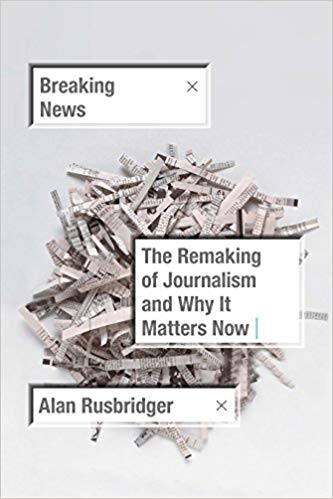You have /5 articles left.
Sign up for a free account or log in.
 Breaking News: The Remaking of Journalism and Why It Matters Now by Alan Rusbridger
Breaking News: The Remaking of Journalism and Why It Matters Now by Alan Rusbridger
Published in November of 2018.
Breaking News is the best book that I’ve read on the impact of the digital economy on the creation, consumption, and economic viability of journalism.
The book is an inside account of what it felt like to edit The Guardian newspaper as emerging digital platforms, such as Craig’s List (classified ads) and Google (search advertising) and Facebook (social), undermined the economic model in which newspapers depend.
That this is a story of a British newspaper should not discourage the American reader. The Guardian has evolved from a medium circulation English broadsheet to one of the most widely read online news publications in the world. In 2014 The Guardian won the Pulitzer Prize for its reporting, based on data provided by Edward Snowden, of the National Security Agency’s surveillance activities.
Too few books have been written on the business of newspapers from inside the industry. Alan Rusbridger, who edited The Guardian from 1995 to 2015, makes an ideal guide for the story of how newspapers - so essential to the operations of a free society - have become almost impossible to sustain in the age of Google, Facebook, and Twitter.
Newspapers have always relied on advertising, and in particular classified ads, to cover the gap between the cost to produce and distribute the news and the revenues that come from subscriptions and newsstand sales. When the bottom fell out of the advertising market, and then circulations fell off a cliff due to the availability of free web news, newspapers began to face an impossible financial reality. They were left with a choice of continuing to focus on print - and of becoming irrelevant as print died - or of trying to build and then monetize a sizeable digital audience.
Rusbridger goes into great detail about how neither choice, the focus on print or digital, ever resulted in a viable business model for producing the high-quality journalism found in The Guardian. The paper only survives today as a result of the funding available from the Scott Trust endowment.
It is not that much of stretch to think of the future of universities through the lens of the newspaper industry. All of us are wondering how traditional residential institutions will navigate the digitally enabled shift to online and low-residency learning.
Are residential campuses analogous to print newspapers?
Is online learning analogous to news websites and apps?
Are the bundled costs of credentialing, teaching, residence halls, athletics, and research production similar to the bundled product of a physical newspaper?
If both universities and newspapers serve a public good beyond what is rewarded in the market (perhaps an assertion that we should debate), then what new economic models will enable both to thrive in the new digital economy?
So far, we have not witnessed the sort of industry-wide hollowing out of the higher education business as we witnessed in the newspaper business. From 2008 to 2017 the number of newsroom employees in the U.S. fell by 23 percent, from 114,000 to 88,000. This decline in the number of reporters was the result of steep drops in revenues from advertising and circulation during this time.
In Breaking News, Rusbridger describes all the various ways that The Guardian tried to find a sustainable revenue model. Experiments included a focus on building up the U.S. digital audience and monetizing through advertising (never successful enough to break even), to encouraging Guardian readers to contribute to the organization as members (the NPR model which was a bit more successful).
The story of The Guardian’s search for economic viability is paid with The Guardian’s efforts to figure out how digital platforms might inform and enlighten readers in ways not possible with print.
In reading Breaking News, I kept thinking about how the lessons of The Guardian (and the newspaper business in general), may apply to higher education. Many smart observers believe that higher ed may be in for a similar economic reckoning as newspapers. Others think that higher ed is not the same as legacy information industries and that we will be more resilient.
What we learn in Breaking News is that the smart people working in the newspaper industry did not see the digital disruption coming, and even when they understood the implications of digital they were unable to find a new economic model to replace the old one.
It is not clear that those of us in higher ed will perform much better than our journalist siblings.
Breaking News is a fantastic book. Rusbridger comes across as curious, sympathetic, and modest. Reading Breaking News gave me a much better understanding of what it is like to run a newspaper in a time of profound technologically-driven change.
Are legacy universities the same as legacy newspapers?
Are academics and journalists more similar than we realize?
What are you reading?




